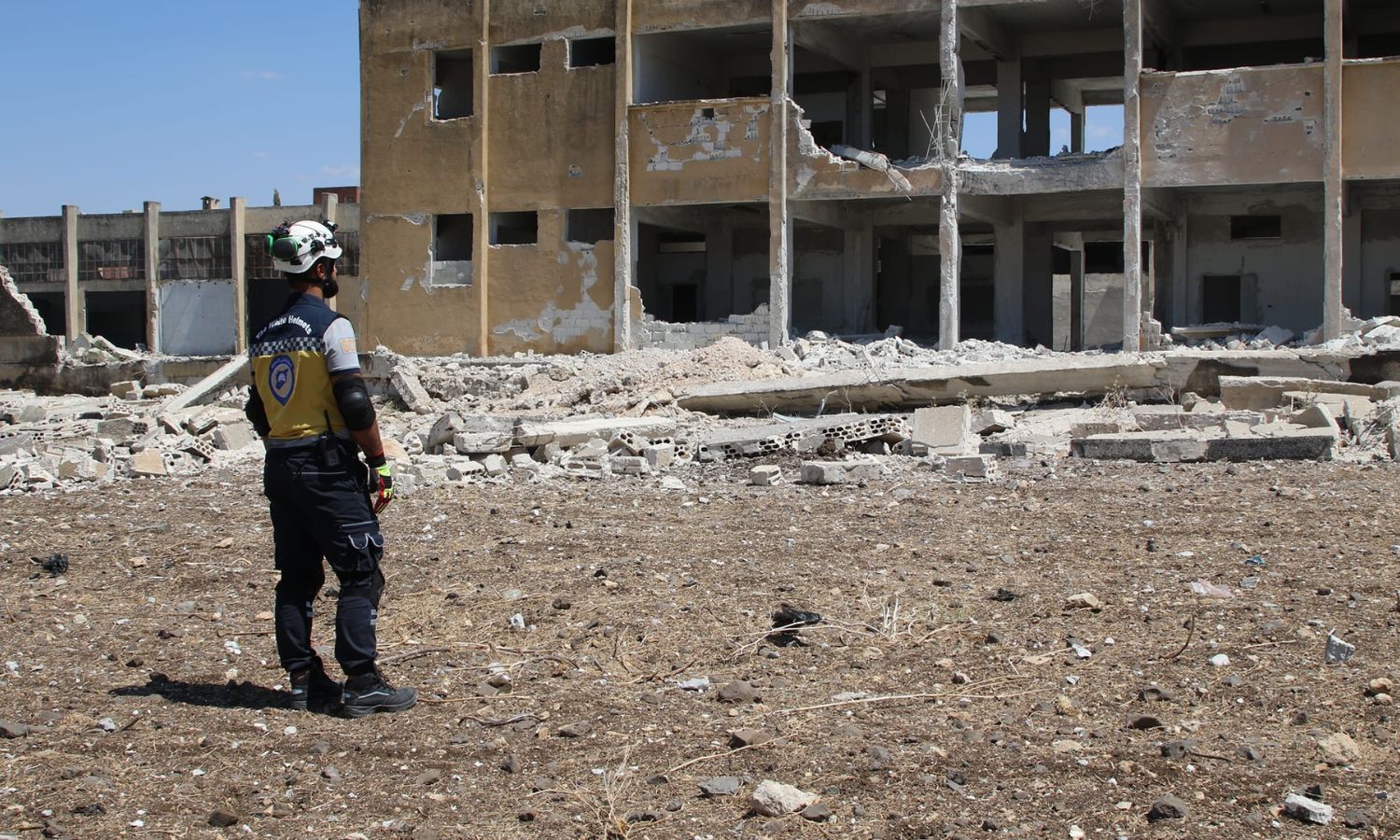



Enab Baladi – Ali Darwish
As political rapprochement between Ankara and the Syrian regime intensifies, Russia has escalated its bombing of civilian areas in northwestern Syria, exacerbating the impact of the Ankara-Damascus thaw on residents who see it as a severe threat on multiple fronts.
The heightened frequency of shelling and the use of suicide drones were preceded by an uptick in the use of Russian surveillance drones for reconnaissance and intelligence gathering missions.
The Syria Civil Defence (White Helmets) warned of “new and dangerous tactics” employed by the regime and Russia, which include using Russian warplanes and highly explosive munitions.
The use of suicide drones targeting civilians and populated areas has increased instability and undermined the lives and activities of civilians in northwestern Syria, heralding potential disaster and another wave of displacement.
“Observatory 80” (Abu Amin), specializing in monitoring military movements in the region, told Enab Baladi that the Idlib region has seen considerable activity from reconnaissance aircraft, both Turkish and those belonging to Russia and the Syrian regime.
The Observatory noted that drones hovered over the al-Ghab Plain in northern Hama, the Jabal al-Zawiya area, and the eastern part of Jabal al-Zawiya, reaching Maarat al-Numan in eastern Idlib.
The absence of Russian drones in previous periods was due to Russia and the regime concentrating on battles in the desert against the Islamic State. Currently, Russia is updating its data and target bank, according to “Abu Amin.”
Russia has recently used several types of drones for surveillance:
The recent targeting by Russia and the Syrian regime in northwestern Syria was not limited to artillery shelling. It also included airstrikes and the use of suicide drones.
The pro-regime local newspaper Al-Watan reported that Russian warplanes, after a 50-day absence, targeted rural Idlib, western Hama, and northern Latakia with high-explosive missiles.
The newspaper, citing “field sources,” mentioned that regime forces targeted Idlib, western Hama, and northern Latakia with heavy artillery.
The Syria Civil Defence documented the shelling and targeting incidents in northwestern Syria over recent days.
On July 11, three drones targeted a civilian car in the village of Farkiya in Jabal al-Zawiya and another civilian car in the village of Shinan. The third drone exploded in a farmland on the outskirts of Shinan without causing damage.
On July 10, Russian warplanes targeted an idle high school on the outskirts of Jisr al-Shughour in western Idlib with two airstrikes.
Similar shelling struck a civilian residence used as a family pool on the outskirts of al-Hamama town, and a location near Ahil Saraqib camp in Jisr al-Shughour. Another strike targeted an out-of-service water station and a civilian residence near it on the outskirts of Sheikh Sindyan village in western Idlib. Airstrikes also targeted the outskirts of Idlib city and the outskirts of al-Ghassaniyah village in the western countryside.
Suicide drones, on the same day, targeted a house on the outskirts of Shinan village and two civilian cars parked near each other in Deir Sunbul village in southern Idlib.
A day prior, a suicide drone attack involving seven drones targeted the town of al-Nairab in eastern Idlib, with four targeting civilian vehicles and an agricultural machine, while three drones exploded before reaching their targets.
This drone assault coincided with artillery shelling by regime forces targeting al-Ruwaiha in southern Idlib.
No civilian deaths were recorded in these airstrikes, according to the Syria Civil Defence.
On July 11, Britain condemned the regime’s use of suicide drones to target civilians and called for those responsible for these crimes against humanity to be held accountable.
The “liberated areas administration,” affiliated with the Syrian Salvation Government (SSG) that holds sway in Idlib, held the “friendly countries” of the Syrian people and the international community responsible for holding the regime accountable and “not whitewashing its crimes and contributing to its impunity.”
In a statement on July 11, the administration added that the regime’s attacks affirm its continued approach of killing, destruction, and displacement, undermining all attempts to rebrand and reproduce it.
The Syria Civil Defence documented 120 suicide drone attacks launched from regime-controlled areas targeting northwestern Syria, resulting in the deaths of three civilians and injuries to 18 others, including two children, in the first three months of this year.
Additionally, the Civil Defence documented the deaths of 38 civilians, including 13 children and six women, and injuries to 150 civilians, including 57 children and 16 women, due to Russian and regime shelling in the region during the first half of this year.
Statements by Turkish President Recep Tayyip Erdoğan and his Foreign Minister Hakan Fidan in the last week of June resurrected the rapprochement with the Syrian regime and Russia’s efforts in this regard.
Erdoğan said at the time that he would develop relations with the regime in the same way as in the past, adding, “It is entirely impossible to say that this will not happen tomorrow, rather it will happen again,” recalling the resumption of Syrian-Turkish relations and Erdoğan’s visit to Bashar al-Assad in 2007, after years of strained relations.
Erdoğan’s statements were followed by several remarks, both from the government and the opposition, reiterating his meeting with al-Assad, the latest on July 12, where Erdoğan invited al-Assad to visit Turkey, indicating that the meeting would take place in Turkey or a third country to resolve differences and start a new phase. He noted that the matter would be followed up by his Foreign Minister Hakan Fidan.
In a previous interview with Enab Baladi, Syrian-Turkish politician Khaled Khoja stated that Turkish policy, no matter how it changes, would not incur losses for the benefit of Russia or Iran in Syria.
However, Turkish policy, according to Khoja, has engaged in various political paths within the region’s political shifts to reach a solution in Syria.
if you think the article contain wrong information or you have additional details Send Correction